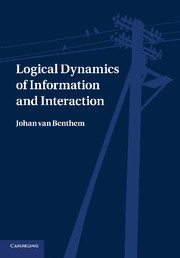Book contents
- Frontmatter
- Contents
- Preface
- Acknowledgments
- 1 Logical dynamics, agency, and intelligent interaction
- 2 Epistemic logic and semantic information
- 3 Dynamic logic of public observation
- 4 Multi-agent dynamic-epistemic logic
- 5 Dynamics of inference and awareness
- 6 Questions and issue management
- 7 Soft information, correction, and belief change
- 8 An encounter with probability
- 9 Preference statics and dynamics
- 10 Decisions, actions, and games
- 11 Processes over time
- 12 Epistemic group structure and collective agency
- 13 Logical dynamics in philosophy
- 14 Computation as conversation
- 15 Rational dynamics in game theory
- 16 Meeting cognitive realities
- 17 Conclusion
- References
- Index
5 - Dynamics of inference and awareness
Published online by Cambridge University Press: 07 October 2011
- Frontmatter
- Contents
- Preface
- Acknowledgments
- 1 Logical dynamics, agency, and intelligent interaction
- 2 Epistemic logic and semantic information
- 3 Dynamic logic of public observation
- 4 Multi-agent dynamic-epistemic logic
- 5 Dynamics of inference and awareness
- 6 Questions and issue management
- 7 Soft information, correction, and belief change
- 8 An encounter with probability
- 9 Preference statics and dynamics
- 10 Decisions, actions, and games
- 11 Processes over time
- 12 Epistemic group structure and collective agency
- 13 Logical dynamics in philosophy
- 14 Computation as conversation
- 15 Rational dynamics in game theory
- 16 Meeting cognitive realities
- 17 Conclusion
- References
- Index
Summary
As we have seen in our Introduction, agents have many ways of getting information for their purposes. Observation, inference, and communication are all respectable means, and logical dynamics should incorporate all on a par. Some of this was done in the logics of public and private observation of Chapters 3, 4. But PAL and DEL still fail to do justice to even the simple story of The Restaurant in Chapter 1, where the waiter mixes observation and inference in one task. The proof system of PAL is a classical static description of properties of agency, not a dynamic account of events of inferential information flow. This mismatch reflects a conceptual problem of long standing, that was briefly raised in our introductory Chapter 1: the variety of notions of information in logic, and the matching variety of acts that handle information. In this chapter, we will explore a dynamic-epistemic approach, showing how these issues can be dealt with in the general framework of this book. The approach comes in two flavours: one based on access to worlds, and one on awareness. Our proposals are quite recent, and they are mainly meant as a point of departure. In Chapter 13, we will discuss their philosophical significance.
Information diversity and missing actions
The problem of inferential information Of our three sources of information, observation and communication seem similar. An observation is an answer to a question to Nature, hearing an answer to a question is like observing a fact. Our logics PAL and DEL handled information flow of this sort. But though entangled with observation, the third fundamental process generating information poses a problem.
- Type
- Chapter
- Information
- Logical Dynamics of Information and Interaction , pp. 100 - 113Publisher: Cambridge University PressPrint publication year: 2011

